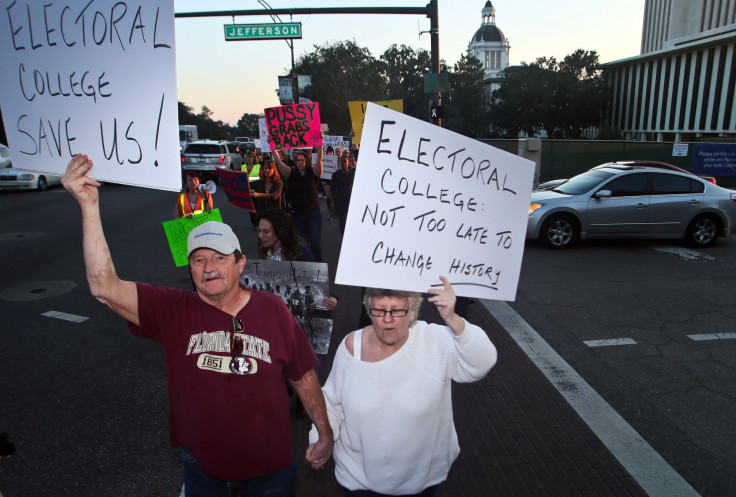Can The Electoral College Stop Donald Trump? Electors Meet Monday To Vote

Anti-Donald Trump forces held a slim hope Sunday 37 Republican members of the Electoral College would revolt and deny the president-elect the White House, but chances of that happening were slim.
The 538 electors meet Monday in their respective state capitals to vote for president, many of them with their hands tied by state law to cast their votes for the winner of the popular vote in their states.
State certified popular vote results show Trump leading Democrat Hillary Clinton 306 electoral votes to 232, though she won the popular vote, the result of large margins in California, New York and Illinois where major metropolitan areas overwhelmingly went for the former secretary of state. A candidate needs 270 electoral votes to capture the presidency. Otherwise, the election goes to the House — and that’s only happened once, in 1824 when the House voted John Quincy Adams into office, rejecting Andrew Jackson, who had received a plurality of the votes.
Since Clinton conceded Nov. 9, much speculation has swirled around whether electors are bound to follow the popular results or whether they can exercise discretion and choose another candidate. So-called Hamilton Electors — so named after Alexander Hamilton for his treatise on the role of electors in the Federalist Papers — have been urging Republican electors who do not support Trump to stand up and “save this country.”
The Electoral College was set up to prevent “the tyranny of the majority” and to prevent someone “who is not in an eminent degree endowed with the requisite qualifications” from taking office. It also was set up to give smaller states a louder voice since each state gets votes for each of its senators as well as the number of members in its House delegation. If the election is thrown into the House, each state gets one vote. Trump won 30 of the 50 states.
The Hamilton Electors are led by a pair of Democrats. Bret Chiafalo of Washington state said the Electoral College should act as an “emergency brake.”
<iframe width="560" height="315" src="https://www.youtube.com/embed/i1UQrWatJ3g" frameborder="0" allowfullscreen></iframe>
“If only 37 Republican electors change their vote, Donald Trump will not have the 270 electoral votes he needs to be president,” Chiafalo said in a video explaining the purpose of the Electoral College. “Thirty-seven patriots can save this country.”
Among Chiafalo’s arguments is that the Electoral College is obligated to prevent a person with ties to foreign countries from taking office. The argument gains momentum amid an assessment from U.S. intelligence agencies that Russia actively tried to interfere with the election on Trump’s behalf. The fact that Trump has refused to release his tax returns and has had nothing but fawning praise for Russian President Vladimir Putin also has lent weight to the movement.
However, intelligence officials have declined to brief the electors on the Russian mischief.
Lawrence Lessig, a Harvard law professor helping to organize the stop-Trump movement, told reporters Thursday at least 20 electors were considering a revolt.
“If it’s clear that it doesn’t make any sense to come out and vote against Donald Trump, I’m sure many of those people won’t,” he said. “If it’s close to 37, or people believe that it is 37, then I think that will give people the courage they need to step up.”
The Associated Press, however, reported the chances are just about nil.
© Copyright IBTimes 2024. All rights reserved.












